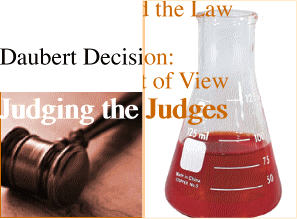 |
|||||||
Expertise |
||


Special Report
Judging the Judges
How well and consistently do judges carry out their 'gatekeeping' role? How well do they understand science? And is this court activity assessed in any way?
Science versus Law: is there common ground in the courtroom?
By Thomas F. Schrager, Ph.D.
The intersection of science and law, highlighted in courtroom cases requiring expert scientific testimony to explain and opine about certain evidence has always been complex and difficult to clarify. The Daubert and related rulings have put further pressure on the relationship, with the court assumiing responsibility for lifting the quality of scientific evidence and testimony. Can this be done and succeed as planned or hoped for? Do judges and the courts have sufficient understanding and training in science to apply the necessary rules and decisions to consistently elevate the outcome?
It seems that the issue goes well beyond this to the very basis of the 'culture' of science versus that of law, and the very different languages and meanings that the two disciplines use, starting with their concepts of causation.
Both disciplines can be said to share a desire for the truth and a process that each is confident best produces such outcome, but truth in the law comes in the context of two parties seeking resolution of a conflict, so that the idea of truth seems to have more to do with justice--that based not simply on the facts of the case, but the facts allowed into evidence, a result is ultimately reached relative to those facts that is thought to be most equitable and 'true' although not necessarily having that much to do with the underlying truth of the circumstances since much of that may have been left out. Science, however, has no such agenda, no two parties, one of whom has to prevail, but only a loyalty to what really is, as far as can be determined at that time.
The nature of a court case in fact has little to do with the truth, in the sense that a requirement to file such suit due to a statute of limitations may have little to do with the timing of necessary scientific information becoming available that would be most pertinent to shedding light on the issue at hand. If such information is not available the case goes ahead without it, and if that evidence is key, the case is thrown out for insufficient evidence. End of story. In science no such timetable is observed.
In law, resolution of each cases is considered the decisive conclusion to that particular issue, not necessarily to be revisited again. In science, certainly in the 'black box' science of toxicology, it is rare when a single experiment or finding is found to be decisive or conclusive, rather than filling in one more question or gap in the information. The general pursuit of a truth continues, with gradual accumulation of information and clarification.
As this process continues and as individual findings are tested and retested, a consensus builds. Although there may be a bell curve of opinions, the slow accumulation of data, of rejection of other findings and the opportunity to challenge and retest findings does lead to a consensus in the mid range of the bell curve.
(continued)
This is quite distinct from what happens in the courtrooom and to the way in which law handles pursuit of 'the truth". In this arenaeach matter is handled and treated separately, and when it is done, it is done. Appeals typically relate to substantial procedural issues and not whether this evidence or that is true or should have been admitted or not. So there is no accumulation of evidence and no building of consensus.
On the contrary, the courtroom is built on two parties 'battling' it out, and only information presented by these two parties will be considered. in the end, one set of facts has to be chosen, whereas in science nothing has to be accepted from many multiples of choices. A consensus is not built but instead an either-this-or-that approach. Unfortunately, such approach may not capture the truth of the event but instead becomes 'the last side standing'.
This also affects the scientist who is testifying within a consensus context but in a forum that sees only two sides, either-or. The consensus approach seems vague and wishy washy and so not precise enough in terms of one or the other option. Non precision is translated as non scientific. Because if 'scientific' means anything it means being definitive and precise. 'Consensus' refers not only to the collected opinions of the scientific community but to the accumulated evidence, that is, not based on this or that piece of evidence but how it all fits together, forms a 'consensus' about what occurred, or, to use other terminology, weight of evidence.
This is what the scientific method is and why it is so hard to define it: it is a process with certain clear-cut practices such as hypothesis testing, falsifiabilty, repeatability, but also it is all of the accumulated understanding of an issue, of dead ends, of non confirmation of a study, of the subtle differences between studies and their findings.
The Daubert and related rulings have increasingly led to consideration of each piece of evidence, each study, each opinion in isolation. Why? Because this is viewed (by the court) as the most 'systematic' way of deconstructing what can be let in and what cannot. The problem with this approach is that by separating studies from each other and opinions from consensus, it renders them without the full meaning within the consensus context.
Unless the court recognizes and addresses these problems and is aware of them in the process of admitting evidence, these problems are likely to continue. The concern, of course, is whether legal method and the legal culture of 'refereeing' evidence will continue unchanged.